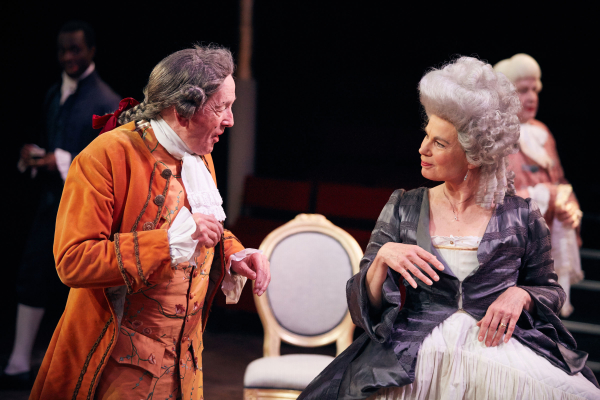The School for Scandal (Tobacco Factory)
Shakespeare at the Tobacco Factory go off-piste with Sheridan’s classic

© Mark Douet
After an exhilaratingly modern Romeo and Juliet, Bristol’s Shakespeare at the Tobacco Factory company gives us a traditional production of Sheridan’s great comedy which feels just as contemporary and as damning of the values of present-day society has it must have done in 1777.
In a world in which once respected newspapers profess themselves aghast that an aspirant Prime Minister should have had talented and attractive girlfriends before getting married, in the world of twitterstorms and Wonga, School for Scandal remains utterly modern. Andrew Hilton’s production, whilst being on the side of the angels, also has the wisdom to tell us that malign gossip exists because we like it.
Sheridan’s wit is given full rein. The grotesques who surround Lady Sneerwell are vivid and malevolent, constantly passing on gossip, trashing with relish the reputations of even their closest friends. Julia Hills' excellent Lady Sneerwell, though, doesn’t laugh when age is mocked, aware no doubt of what others will be saying about her behind her back; a reference to ‘disappointed widows’ hits home.
The famous screen scene comes off beautifully: the in-the-round staging is used here to great effect, as it is (with the help of the audience) in the scene where Charles sells off the family canvas. The design by Emma Bailey trusts to our imaginations: a few chairs, a chaise longue, a harpsichord are all we require.
As ever with this company there is not a weak link in the cast. I particularly enjoyed Christopher Bianchi’s Peter Teazle; credulous, foolish in his choice of a wife but aware that he has no one to blame but himself. He is well matched by Daisy Whalley’s Lady Teazle, an innocent country girl keen to discover all that is fashionable in London and able to give as good as she gets when in dispute with her husband. As she says, "If you wanted authority over me, you should have adopted me and not married me. I am sure you were old enough".
Paul Currier makes a suitably oleaginous Snake, a representative of the press who has "nothing but my infamy to live on". Byron Mondahl starts and finishes the evening off in style with a prologue and epilogue wittily updated by associate director Dominic Power.
This first attempt at eighteenth century drama shows the company at its best: it is clear, funny, well acted and makes the author the star of the show. It enables the play’s contemporary relevance to emerge from the text; Hilton knows his audience can see contemporary parallels for themselves.
If I had a criticism, it would be that they could shave 10 minutes off the running time, though that should happen as they settle into the run. I look forward to seeing what they do with Brian Friel’s relatively unknown Living Quarters this autumn.
The School for Scandal runs at the Tobacco Factory Theatre until 9 May 2015












